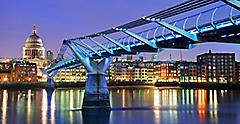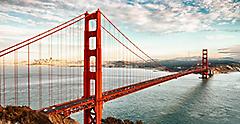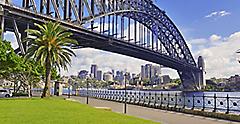Much like churches or skyscrapers that make you admire their wonder, the world's most famous bridges are architectural marvels that enrapture their beholder with fascinating history and technical mastery. They speak to the ingenuity and determination employed by an architect to bridge two sides of the land. The magnitude — and beauty — of popular bridges worldwide can draw a crowd to climb them, cross them, sail beneath them or simply enjoy their sights from a distance. While some achieve fame through sheer scale, others captivate through a sense of story and heritage. Let’s take a journey to explore the 10 most beautiful bridges in the world.
Famous Suspension Bridges
1. Tower Bridge in London, England

There are hundreds of notable bridges crisscrossing the River Thames, and many of the famous bridges in England can be found in London. Tower Bridge, built in the late 1800s over the span of eight years, is considered the most modern bridge of its time. This is attributed to its ability to open up to allow shipping traffic to pass underneath. This famous suspension bridge features gothic towers that seem to guard the entrance to the city, though with over 40,000 crossings every day, it's more welcoming than it may appear.
If you’re on vacation in London, you can book a Tower Bridge tour directly through their tourism website. While it's suggested that you wear comfortable shoes due to the climb up and down the tower's many stairs, there is an elevator, making it accessible to all. If you stroll along the River Thames, you may also pass London Bridge and Westminster Bridge, offering stunning views of the Houses of Parliament.
2. Millennium Bridge in London, England

For fans of modernist architecture, the Millennium Bridge is one that catches the eye, as it did mine. As my husband and I toured the Tate Modern, a view of this twisted structure presented itself to us via a vertical row of windows in the Tate. It was too tempting to resist sneaking a photograph of the juxtaposition of the modern bridge from within the old concrete walls of the gallery. While I haven't looked at those images in a few years, the memory is firmly imprinted in my brain.
This is a famous bridge in London for pedestrians, colloquially anointed the "wobbly bridge" due to its initial shakiness upon opening in 2000 (which has since been corrected). While there is no official tour of the Millennium Bridge, there's no finer way to walk up to St. Paul's Cathedral on the north bank of the River Thames.
3. Golden Gate Bridge in San Francisco, United States

When you think of the most famous bridges in America, the Golden Gate Bridge in California will almost certainly come to mind. It spans the Golden Gate, connecting San Francisco with Marin County.
When it was built in 1937 at a length of 1.7 miles, it was considered the longest suspension bridge in the world. Often also described as the most photographed bridge in the world, its orange frame reflects sunlight to make it visibly glow against a stunning backdrop of low-hanging clouds and a navy blue Pacific Ocean on a beautiful afternoon.
The bridge is also remarkably accessible given its position and height of 746 feet. Visitors can join tours of the bridge with a multitude of operators. Active guests can take a guided bike tour across this famous suspension bridge, while some of the most spectacular views are undoubtedly those taken in from the deck of a boat.
Famous Arch Bridges
4. Ponte Vecchio in Florence, Italy

Without a doubt, the most famous bridge to travel to in Florence, and perhaps all of Tuscany, is the Ponte Vecchio — or “Old Bridge.” Considered an engineering marvel when it was built in the 1300s, this arch bridge still boasts bustling stalls and shops, much like it did centuries ago. Initially occupied by butchers and fishmongers, the ruling aristocracy evicted them due to the strong odors that filled the halls.
The stores today feature the jewelers who replaced them. In summer, the confined and hot environs are not for the claustrophobic. We found it easy to be overwhelmed by the cacophony of vendors and hagglers alike. However, this historic crossing is a superb vantage point for photographing the Arno River that runs underneath it — and for people-watching.
Honorable Mentions: Rialto Bridge and Ponte dei Sospiri in Venice, Italy
In Italy, Venice has two instantly recognizable bridges well worth a detour from canal-hopping. Within walking distance from Venice’s port is the Rialto Bridge, which started life humbly and has undergone many rebirths. Originally a pontoon bridge in the 1100s, it evolved into a wooden bridge before finally being constructed from stone in 1591. It wasn't without controversy either, as the single-arch bridge design was considered unstable and destined to end in ruin. In its 5th century, Antonio da Ponte rebuilt Rialto Bridge, while maintaining some of its original features, including two rows of shops lining either side of a central portico.
A short eight-minute walk away is the Ponte dei Sospiri — the Bridge of Sighs. This covered bridge connected the prison to the interrogation room at the Doge's Palace. Legend has it that this bridge gained its wistful name because its windows offered one final picturesque view of Venice to prisoners as they were led away to imprisonment.
If you're a romantic, then kissing your significant other under the bridge (presumably in a gondola!) is supposed to bring everlasting love and happiness. The bridge is built of Istrian limestone and is certainly beautiful, though visitors can only access it internally via a guided tour of the Doge's Palace.
5. Pont du Gard in L'Occitane, France

Not all famous bridges are crowded with tourists. The Pont du Gard is one example, located between Nimes and Avignon in the countryside of southern France. This Roman aqueduct is one of the most famous bridges in France, and was built in the first century A.D. to carry water over a distance of 50 kilometers.
The bridge itself is tremendous to see in person. Arches span across the horizon as far as the eye can see. The surrounding site is a respite from tourists on the bridge itself; tranquil waters bordered by vast green spaces offer a chance to unfurl a blanket and take in a picnic or simply relax and breathe in the fresh country air. For those who didn't pack a picnic, an onsite restaurant offers lunch on weekends — just ensure you book in advance.
Another honorable mention in L’Occitane is the Millau Viaduct, completed in 2004 across the Valley of the Tarn.
6. Puente Viejo Between Seville and Malaga, Spain

Nothing quite prepares you for that first initial view of Ronda, the town seemingly gripping the stone cliff face with iron claws, determined not to let go. Located between Seville and Malaga, Ronda is a must-see Andalusian jewel, and the Ronda Bridge is one of its popular bridges. It was built to connect the old Moorish-era town with the new town and spans a gorge over 700 meters deep across the Guadalevin River.
In 1734, architects Jose Garcia and Juan Camacho quickly built the Puente Viejo (Old Bridge) to unite the two parts of the town over the deep gorge using one arch. Unfortunately, this old bridge couldn't handle the number of pedestrians, wagons and livestock crossing it daily. It collapsed, killing 50 people. In 1759, architect Antonio Diaz Machuca built a newer, stronger bridge, Puente Nuevo (New Bridge), which saw completion in 1793. Diaz Machuca is best known for inventing the machinery necessary to lift the enormous rocks from the ravine to help build the bridge.
Today, hikers can climb down trails into the ravine for a fantastic photo op. We walked a short way down in time to marvel at one of Spain's most notable bridges during a picture-perfect sunset. The sky lit up the stone bridge in shades of rose gold, purples and oranges, making this place even more magical and ethereal than anyone could imagine possible.
7. Sydney Harbor Bridge in Sydney, Australia

Nicknamed “The Coathanger” by locals, the Sydney Harbor Bridge is one of the most famous bridges in the Southern Hemisphere. Opened in 1932, this steel behemoth connects Sydney’s CBD with its northern suburbs. It’s a practical thoroughfare and a bucket list experience for adrenaline junkies who want to climb it. Strapped into a harness, visitors can ascend its arch, 134 meters above sparkling Sydney Harbor. From its heights, you’ll see ferries darting below, seaplanes puttering overhead, and the iconic Sydney Opera House.
If you’re cruising into Sydney, you’ll likely sail beneath it. Many passengers (myself included) opt to book a balcony cabin just for golden hour arrival — it’s easily one of the most memorable port entries in the world.
Famous Beam Bridges
8. Labajin Bridge in Sichuan, China

Nestled deep in Sichuan’s rugged landscape, the Labajin Bridge is a gravity-defying marvel of modern engineering. Spanning 1,140 meters (almost 4,000 feet), this cable-stayed beam bridge was built to traverse the region’s steep gorges and river valleys, making life easier for locals and adventurers alike.
What makes Labajin Bridge unique is the way it blends raw strength with elegance, almost like a tightrope stretched between mountain giants. It’s a perfect pit stop for cruise passengers seeking a snapshot of China’s ambitious infrastructure in action — a symbol of how human ingenuity can literally bridge the impossible. While there aren’t formal tours of the bridge itself, the best way to take it in is from one of the nearby viewing platforms. Bring binoculars and a sense of awe.
9. Bølsoy Bridge in Molde, Norway
If you venture to Molde, Norway, one of the highlights is the Bolsøy Bridge, about 10 minutes by car from the Molde cruise port. This sleek bridge, completed in 1991, stretches over the glassy Moldefjord, linking the mainland to tiny Bolsøya Island.
As my husband and I made an impromptu detour from the Atlantic Road, we paused at a layby near the bridge as the late evening sun cast a burnished glow over the water. The best part is that there are no guided tours, so it’s easily accessible — and a sight to behold amid Norway’s green fjords and misty skies.
Famous Truss Bridges
10. Tokyo Gate Bridge in Tokyo, Japan

Nicknamed “Dinosaur Bridge” for its twin humps that call to mind a pair of prehistoric creatures in mid-clash, the Tokyo Gate Bridge is a salute to both Japanese engineering and playful design. Opened in 2012, this truss cantilever bridge connects Tokyo’s waterfront to the man-made Wakasu Island. And while it serves a practical role in managing port traffic, it’s also quickly become one of the most famous truss bridges for photographers chasing blue hour shots.
If you’re docking into Tokyo Bay on a cruise ship (which I highly recommend — the city’s skyline glittering over the water is a sight worth experiencing), you’ll glide right past this distinctive silhouette. On land, there’s a dedicated pedestrian walkway offering panoramic views of Tokyo Tower, Skytree and even Mount Fuji on a clear day. Visit in the late afternoon, when the setting sun catches the bridge’s steel frame.
Explore the World To See the Top 10 Famous Bridges

Bridge architecture is particularly jaw-dropping because of its beauty and ingenuity. From the world’s longest to the most modern and unique, the planet is full of famous bridges waiting to inspire and connect you. And there’s no better way to experience the best bridges in the world than by cruising beneath them.
Explore our cruises and connect with stunning sights and engineering wonders waiting for you around the globe.
Get Royal Deals, Sign Up Today

Getting There
Explore Our Most Affordable Itineraries
Get your cameras ready to take in some of these and other bridges around the world with The Ultimate World Cruise.










